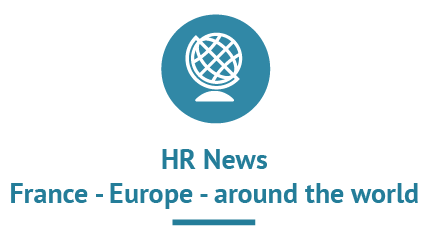|
If you are having trouble viewing this email, open it with your internet browser,
download the PDF version
or contact us.
|
 |
| #32 - February 2021 |
| PDF version - Manage your subscription - Search - Archives |

|
|
vision RH is a newsletter published by the French Directorate General for Administration and the Civil Service (DGAFP). It draws on information sources and reports issued by public administrations, the private sector, international organisations and the press, in several different languages. It aims to provide a broad view of current human resources and civil service initiatives.
|
|

|

|
| Why not capitalise on the many advantages provided by mentoring? | |||||
|
This practice is gaining more and more traction as it offers a tailored and effective solution to various workplace issues. Nevertheless, in order for it to take place under optimum conditions and to succeed, mentoring, which tangibly leverages the transmission of knowledge, must be subject to specific oversight. Mentoring is very infrequent in the French civil service for a variety of reasons (time spent is not always acknowledged and there are still problems in pinpointing the benefits). It is however being mainstreamed in a number of countries (1) that consider it a solid means of supplementing skills acquired through training. To help improve integration, a course has been introduced in Sweden for newly-hired executives. It lasts for six months and has a dual goal: to raise awareness of diversity in the public sector (highest rate in the EU) and to familiarise other nationalities with government practices. The mentors are incumbent executives with personal experience of this situation. Israel is taking a similar approach. Mentors, who are different from the line managers, are involved from an earlier stage, before the person takes up his/her position and for one year thereafter. They are provided with a monitoring instrument to manage the four support stages that they will progressively handle and assess. In both Austria and Ireland, targeted programmes aim to encourage more women to take up management positions. Interministerial networks have been formed to actively buttress career development. Each member commits to personally help an applicant to outline her personal career path. The mentoring chosen by Portugal is geared towards developing innovation and leadership. On a voluntary basis, the system allows civil servants to be assisted by experienced professionals from diverse sectors with an eye to gaining fresh knowledge and bolstering individual capabilities. To build these bridges on top of existing structures, the Belgian Federal Public Services have introduced cross-cutting mentoring. The premise is straightforward: a civil servant assumes responsibility for and advises a colleague from another organisation who is looking to move forward with his/her career. As the two parties do not necessarily carry on the same occupation, the primary result is an exchange of practices. Even if there is a framework, it is not always simple to find an ad hoc partner. In the United Kingdom, an app puts civil servants looking for a mentor in touch with those who are offering to share their skills with a colleague. Setting up a profile is deliberately limited to providing essential information and LinkedIn users can also import certain data (identity, position and location, areas of expertise). Along the same lines, in South Korea, the e-Saram HR information system has a functionality that allows managers to identify pairs. Usually, we imagine that mentors are older employees but young people may also be called upon to help their elders to familiarise themselves with new resources. In the United States, this reverse mentoring is gaining ground. A number of federal agencies, such as NASA, have taken the plunge and their senior executives are now benefitting from this assistance. Young pensioners can also use the model to ease their transition to retired status. In Lithuania, for instance, they are offered mentoring contracts with a maximum two-year term when they agree to pass on their know-how. They are both more readily available and able to supplement their pensions.
|
|||||
|
|||||
|
|
|||||

|
|||||

|

|

|
| Spain: setting up temporary project management entities | |||||
|
To contribute flexibly and effectively to the implementation of its imminent recovery plan, the government has adopted a resolution for setting up temporary and cross-cutting administrative units for managing and implementing projects. Relevant staff will be transferred to these units and they are guaranteed to be able to re-join their original department at the end of the period. |
|||||
|
|||||
|
|
|||||

|
|||||
| Netherlands: drawing up a collective bargaining agreement on hybrid work | |||||
| Already being well ahead of the pack as regards teleworking, the country is working on a policy that it wants to roll out and make lasting once the crisis is over. A new collective bargaining agreement setting out the legal aspects of a hybrid model (on-site and remote working on the basis of equivalent working hours) has been referred for negotiation to the professional bodies. It is set to govern departmental organisation and financial compensation. | |||||
|
|||||
|
|
|||||

|
|||||
| OECD: showcasing innovative toolkits in the public sector | |||||
|
The Observatory of Public Sector Innovation (OPSI) compiles toolkits developed by Member countries. Until now, they have been described by their designers and the results could be filtered by typology criteria. To be assured of the extent of the toolkits’ development and, more importantly, their actual effectiveness, verified reviews and practical advice for implementation will be gradually added. « Today we want to encourage dialogue about how the tools are used in practice by real users »
|
|||||
|
|||||
|
|
|||||

|
|||||

|

|
| United Kingdom: using AI in a rational manner in recruitment procedures | |||||
| Capitalising on the many opportunities provided by artificial intelligence is an emerging trend. In the UK, the regulatory authority responsible for upholding information rights warns the civil service about the risks, or even abuses, which could be caused by the mainstreaming of intensive automation. Algorithms result from human programming and, as such, do not guarantee either equal treatment or non-discrimination. | |||||
|
|||||
|
|
|||||

|
|||||
| France: resources to help with employment transitions | |||||
|
If they are found to be unfit to hold their position on health grounds, local civil service employees have been entitled, since 2019, to a preparatory adaptation period before starting their new job. To help them and also to train the HR departments that will assist them during this twelve-month period, the National Local Civil Service Centre (CNFPT) has prepared a guide on managing reclassification supplemented by a special training programme. |
|||||
|
|||||
|
|
|||||

|
|||||
| Europe: public servants and the COVID-19 pandemic | |||||
|
How have public servants been experiencing the situation caused by the pandemic? In an attempt to reply to this question, a survey has been conducted in eight European countries (Germany, France, Ireland, Italy, the Netherlands, the United Kingdom, Sweden and Switzerland). It highlights employees’ commitment and high expectations across four sectors: skills, technology, team interaction and work environment. « Public officials are willing to learn, train and collaborate more between departments in order to improve the service delivered »
|
|||||
|
|||||
|
|
|||||

|
|||||

|

|
| Norway: guide to successful integration through remote management | |||||
|
Due to the ever increasing recourse to teleworking, the Agency for Public and Financial Management (DFØ) has drafted a guide for managers to ensure that new recruits are successfully welcomed and integrated when daily on-site working is not possible. It contains ten stages, provides tips and underscores the priority issues (coming up with new informal forms of contact, systematic feedback on work). |
|||||
|
|||||
|
|
|||||

|
|||||
| France: a service offering to extend 360° appraisals | |||||
|
360 degree appraisals, which are already conducted in a number of countries, are of increasing interest to French central government departments. Drawing on experiments carried out in five ministries and by the Senior Executives Task Force, the Directorate General for Administration and the Civil Service (DGAFP) is offering its expertise to spur government departments to take ownership of this method which enhances the range of perceptions by factoring in contributions from subordinates, colleagues and partners. |
|||||
|
|||||
|
|
|||||

|
|||||
| Italy: a mobile app on civil service law | |||||
|
The purpose of a new app called “ABC dei Dritti” is to compile and explain, in a pedagogical manner, the main legislation governing civil servants in a database with alphabetic and topic-based entries. It is updated by adding the judgments and decisions which have become case law. In addition, users can put questions to experts who will provide tailored answers. « ABC dei Dritti, designed and updated by experts, quickly provides a clear and precise answer to legal questions »
|
|||||
|
|||||
|
|
|||||

|
|||||

|

|
| Switzerland: priority for collective spaces in desk sharing offices | |||||
|
Making the best use of office surface areas against a backdrop of reduced presence on-site is set to become a reality within the Federal Administration. Wherever possible, with help from the Property Directorate, departments will have to change existing offices into collective spaces in which employees will be allotted interchangeable places that may vary depending on availability and the use made by each of them. |
|||||
|
|||||
|
|
|||||

|
|||||
| Germany: bolstering social dialogue in the Federal Administration | |||||
|
As promised by the coalition government, the federal employee representation act is set to be amended. This basically involves strengthening codetermination in areas such as working-time arrangements, transfers and secondment of staff, work/life balance, employees’ health and outsourcing assignments. |
|||||
|
|||||
|
|
|||||

|
|||||
| Ireland: insights from a survey on “forced” remote working | |||||
|
A survey, which was conducted nationwide in late 2020, provides insights into the experiences of the majority of staff who were obliged to work remotely for a number of months. There was a very high participation rate with 88% of respondents believing they are as effective working remotely as they are in their normal place of work. This figure should be correlated with the fact that 75% of those polled acknowledged that they were able to count on the support of their superiors. « This study clearly highlighted the importance of keeping in touch with colleagues and supporting each other »
|
|||||
|
|||||
|
|
|||||

|
|||||

|

|
| Safran moves ahead of the field by becoming a “learning organisation” | |||||
|
One of the principal challenges for all firms is not only being able to react but also to plan ahead for increasingly rapid changes. In-service training is still the best way of providing all employees with optimum skillsets. And, ideally, it can become the driving force for the whole organisation. Drawing on the fact that over two thirds of relevant knowledge (1) comes from experience gained in professional situations, the French aeronautics group has elected to take advantage of this “bonanza” via a vibrant learning community. Everything is being done to ensure that work groups are constantly being set up with a focus on interactive methods using creativity and innovation, as well as critical thinking. As the COVID-19 pandemic has led to a drop in physical attendance, all trainers are well conversant with specific digital coordination techniques. “Authoring tools” have been developed to enable each employee to make a contribution. These allow people to create their own learning content. Safran University's 360 learning portal already offers close to 4,000 programmes developed this way. After several months, an in-house survey will be conducted to examine the initial outcomes and a maturity map for this change of strategy will be produced.
|
|||||
|
|||||
|
|
|||||

|
|||||

|

|
| Management by quality boosts effectiveness for civil servants in Croatia | |||||
|
Government departments have to constantly take up the challenges of meeting users’ expectations by offering ever more accessible services and by standardising and streamlining procedures to heighten their effectiveness. These actions are the cornerstones of any system of management by quality. There are a number of models (1): ISO (originally designed for industry), EFQM and CAF, tailored to the public sector, but these are usually restricted to a given entity. The government in Zagreb is taking an innovative approach to developing its new reform programme by rolling out a blanket system in the entire public sector. It is a bold strategy in light of the repercussions for management and work organisation. The project was initiated in early 2020 with backing from the European Union (ESF Operational Programme “Efficient Human Resources”). It is managed and overseen by the Ministry of Justice and Public Administration. A consortium of three service providers is tasked with project ownership and the National School of Public Administration is responsible for the training component. .
Over 130 departments volunteered for the launch stage. The nine that were selected are representative of all bodies (central government, local authorities, agencies and government-funded establishments and institutions). The various workshops had to be arranged online due to the COVID-19 pandemic and this challenge was soon perceived as an advantage by the participants. They came to understand the extent to which the improvement of processes and digitalisation are vital for their day-to-day activities. An entire course, using two new methodologies that were approved during the trial stage, will be made available to 600 civil servants. It is broken down into four modules: • Modelling and optimising occupational processes • Developing and rolling out a quality management system • Monitoring, assessing and improving the system • Training for trainers Concurrently, the skillset framework for all the targeted positions (supervisors, quality managers, in-house auditors and external assessors) is being updated. The theoretical knowledge and practical experience gained will be validated by means of certification.
|
|||||
|
|||||
|
|
|||||

|
|||||

|
|
Share
|
||||
|
||||
| SUBSCRIBE - UPDATE YOUR SUBSCRIPTION - ARCHIVES - RSS - UNSUBSCRIBE |
|
French Directorate-General for Administration and the Civil Service (DGAFP)
Publication Manager: Nathalie COLIN Managing Editor: Nathalie GREEN Editor-in-chief and Autor: Jean-François ADRIAN Layout and graphic design: Jean-François ADRIAN and Aphania. The texts of the publication do not reflect the point of view of the DGAFP
In accordance to the French Act n°78-17 of 6 January 1978 on information technology, data files and civil liberties and to the european General Data Protection Regulation (GDPR), your personal data is stored securely and you are entitled to access, correct and delete them. To do so, you should send an e-mail to (contact-visionrh@kiosque.bercy.gouv.fr) or write to DGAFP: 139, rue de Bercy - 75012 Paris; France.
Reproduction is authorized with mention of the source © DGAFP 2021 / N° ISSN: 2606-7528. |
|
|






